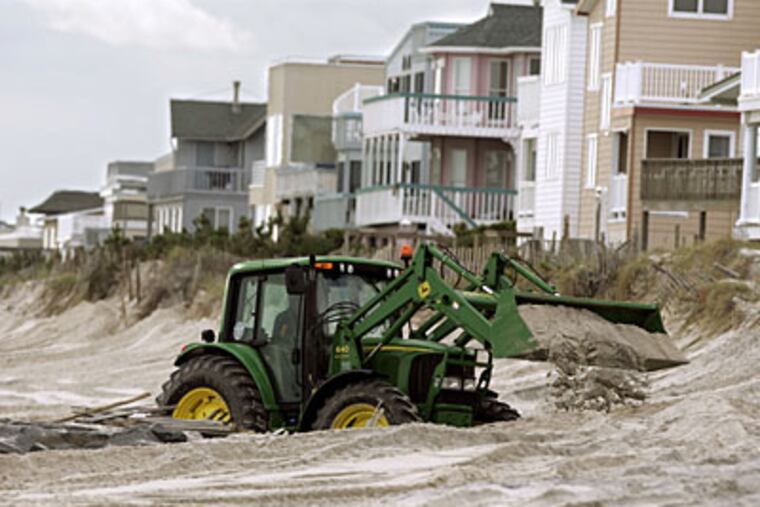Officials: Ruling could kill beach replenishment
HARVEY CEDARS, N.J. - A ruling to compensate the owners of a Long Beach Island property nearly $500,000 for loss of their ocean view could threaten the future of government-funded beach-replenishment projects, officials say.

HARVEY CEDARS, N.J. - A ruling to compensate the owners of a Long Beach Island property nearly $500,000 for loss of their ocean view could threaten the future of government-funded beach-replenishment projects, officials say.
Borough leaders say they were stunned this month when a court-appointed panel in Ocean County awarded Martin Flumenbaum and Ruth Hochberger $480,000 for an easement needed in a $25 million federal beach-replenishment project in Harvey Cedars.
The pair's East 83d Street vacation home, assessed at $3 million, is on a corner lot where the Army Corps of Engineers intends to create a 25-foot protective dune. The easement was one of 11 taken by the borough through eminent domain in July 2008 after property owners refused to give the corps access.
The easements, which do not transfer ownership of the land, permit the corps entree to widen the beach and build dunes.
Harvey Cedars offered Flumenbaum and Hochberger $300 for the 8,500-square-foot swath of land. According to the borough, the municipal appraiser set compensation after weighing the project's benefit in protecting the owners' property from storm damage and erosion vs. the loss of the view from the first floor of their two-story structure.
The pair appealed the offer in Superior Court, which appointed a panel of condemnation commissioners to determine fair market value. Seven other homeowners whose easements each were assessed at $300 also are appealing; the panel has not issued its findings in those cases.
The commissioners' $480,000 award, which state officials say is unprecedented in decades of Jersey Shore refurbishment projects, has been appealed by the municipality, Mayor Jonathan Oldham said. The Harvey Cedars project would provide dune repairs and beach widening along 20 blocks.
"The amount of money involved is very surprising. It's shocking. We'll keep appealing until we can't appeal anymore," Oldham said.
"If this ruling is ultimately upheld, if some sort of equitable settlement can't be reached, this will be the end of beach replenishment in New Jersey," he predicted. The cost to municipal, state and federal governments - which share the financial burden of such projects - will be too high, he said.
Joe Mancini, mayor of neighboring Long Beach Township, called the ruling chilling. He said the township would consider an ordinance next month that would allow it to make emergency repairs to storm-damaged beaches where owners have refused to grant easements if that damage is a threat to public safety or surrounding property. The cost would be billed to homeowners who did not comply with the easement request.
Mancini said the township and some beachfront property owners also are considering a class-action suit to force so-called easement holdouts to pay them damages.
"Our hope is that these holdouts will see the benefit of complying," Mancini said.
Battles over easement compensation encourage the state Department of Environmental Protection to avoid towns.
"There still are so many public beaches and beaches where easements have been obtained," said David Rosenblatt, administrator of the New Jersey Department of Environmental Protection's Office of Engineering and Construction, which oversees replenishment projects.
"Municipalities can choose on their own whether they want to pay for these easements. If they don't, we don't do the work," Rosenblatt said.
Oldham said officials were not surprised that the panel, which comprises two lawyers and a real estate agent, found "fair compensation" to be more than $300.
That the sum was more than a thousand times higher "made no sense," he said. The panel said it based its decision on the effect the dune would have on Flumenbaum and Hochberger's property value.
Lawyer William Ward, an expert in land use and property rights who represents the pair, contends that the $300 offer was "absurdly low."
The home offers a prodigious view of the oceanfront in three directions, Ward said. A 25-foot dune would block the view from the first floor and severely limit it from the second, he said.
Ward said his clients had waited for the borough to make a "more reasonable" second offer. "Maybe there will be some room for negotiation once the case goes before a judge," he said.
Though he would not discuss the Harvey Cedars case, Keith Watson, project manager for the Army Corps of Engineers, said he worried about delays in nourishing some beachfronts.
"The first row of houses will eventually be on the ocean" with a sliver of beach in front of them, he said. In time, "they would be in the ocean."
Harvey Cedars is awaiting a date for its appeal hearing, Oldham said. Where work does not require involve easements, the replenishment will likely be completed before the appeal is settled, officials said.